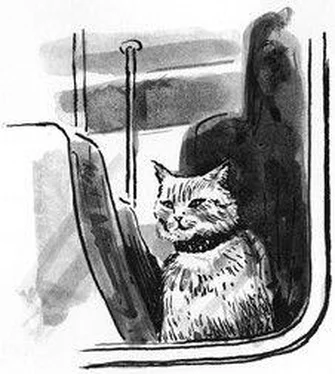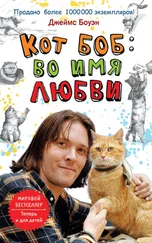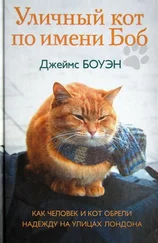As a result, Bob and I became, to all intents and purposes, minor celebrities, appearing on television and radio programmes to talk about the book and its popularity. It wasn’t something for which I was prepared, even after my afternoon of media training. Our first major appearance, on the BBC’s Breakfast programme was typical. I arrived at the studios in West London at the crack of dawn a bundle of nerves. I was paranoid that Bob would be scared of the lights or the strange surroundings. But he’d taken to it all, sitting on the sofa serenely watching himself on the monitors in front of him. He’d naturally been the star of the show, even managing to do a series of high fives for the hosts who seemed to be every bit as bewitched by him as everyone else. It was the same when I made other appearances.
Wherever we went I was asked the same questions. In particular, people would begin to wonder how the success of the book was changing life for the both of us.
The most significant and obvious change was that Bob and I no longer needed to put ourselves in harm’s way on the streets. It took a little while for the financial rewards of the book’s success to trickle in, so for a few months we had continued to busk on Neal Street. Gradually, however, we were able to ration our appearances. It was such a huge relief to wake up each morning knowing we wouldn’t have to face the cold and the rain and that I wouldn’t have to experience that sense of uncertainty and quiet desperation that I felt each day I used to set off for Angel or Covent Garden.
A small part of us would always remain there of course. You can take the busker off the street… and Bob has always loved the attention he gets from admirers. So we continued to make occasional appearances, the only difference being that we now did so in order to help other people rather than ourselves.
At the beginning of 2013, for instance, we formed a relationship with the animal charity, Blue Cross. We began collecting money for them both online and via public appearances and our occasional days busking. We raised almost £5,000 in the first week. It felt fantastic to be able to give something back. They were so kind to me during my early days with Bob and continued to help us when we popped into their weekly clinics on Islington Green. I remembered how I’d often felt that Bob was my reward for some act of kindness that I’d bestowed on someone earlier in my life. I’d felt like it was karma. By adopting the Blue Cross, I felt like I was now reciprocating their generosity, performing another act of karma. I aim to do the same thing for homeless charities at some point in the future.
Of course people also asked me if the book had made me rich. The answer to that was yes and no. Compared to where I’d been financially, I was, by any stretch of the imagination, comfortable. But I didn’t become an overnight millionaire. The important thing was that, for the foreseeable future, at least, I knew I wasn’t going to be reduced to scouring the shelves of supermarkets for 10p tins of past-the-sell-by-date baked beans. For years I had to rely on my wits and a few state hand-outs. Now, for the first time in many years, I had a bank account and even an accountant to help me manage my affairs, including my taxes. I hadn’t earned enough money to be eligible to pay tax in the past decade. The fact that I now began doing so was important to me.
When you are homeless or selling The Big Issue you know you aren’t contributing to society — and you know that society resents you for that. A lot of people take great pleasure in telling you so. To your face. ‘Get a job, you scrounging git,’ had been a common refrain for me for a decade. The result of this is that you become gradually more marginalised by that society. People don’t understand that the lack of self-esteem and general hopelessness you feel when you are homeless, busking or even selling The Big Issue is partly down to this. You want to be part of society, but that society is, effectively, driving you away. It becomes a vicious circle.
Paying my way was the most tangible sign that I was once more ‘a member’ of society. And it felt good.
There were so many other positives to the book’s success.
It improved my relationship with my parents. Among the throng at Waterstones on that March evening was my father, who I’d persuaded to come partly out of curiosity and partly for moral support. The bewildered but delighted look on his face when he witnessed the queues will live in my memory for a very, very long time. After all the disappointments, I felt like I’d given him something to be proud about. At last.
He was touched when he was shown the note I’d written thanking him and my mum in the acknowledgements. Apparently he shed a tear when he read the book back at home. He called me up to say well done, and said the same thing again on other occasions. He still told me to get a haircut and a shave, of course, but at least he stopped nagging me to ‘get a proper job’.
We didn’t talk about our feelings about the past in huge detail. That was not his style. He’s not the kind of person to have a big heart to heart. I suspect I knew what he was thinking but I also knew that he couldn’t express it. He couldn’t formulate the words, but that was fine. Knowing was enough for me.
I also travelled to Australia again to spend time with my mother. She’d read the book and wept as well. She told me she felt guilty about many of the things that had happened but was honest enough to say that, as a teenager, I was a nightmare who would have challenged even the most sainted mother. I accepted that.
We were open and honest with each other and realised that we’d be friends from now onwards.
Another satisfying aspect of the book’s success was the impact it seemed to have on people’s attitude to The Big Issue sellers and the homeless in general. Schools and charities wrote, telling me how the story of Bob and I had helped them to better understand the plight of the homeless.
Bob and I were on Facebook and Twitter. Every day it seemed we got a message from someone explaining how they no longer walked past The Big Issue vendors. Many told me they now made a point of always engaging them in conversation. I knew I’d had my difficulties with the magazine, but I felt a huge sense of pride in that. It is a fine institution that deserves everyone’s support, especially in these dark economic times.
On a more profound level, our story also seemed to connect with people who were facing difficult times in their lives. Hundreds of them wrote to me or contacted us via social media. Some read our story of survival and drew their own strength from it. Others recognised the power animals possess to heal us humans. Again, I was immensely proud every time I received a message of this kind. I never in a million years expected that I’d touch the life of one person, let alone thousands.
A few people got a little carried away and bestowed some kind of divinity on Bob and me. Bob might have been a saint but I wasn’t, that was for sure. You can’t spend a decade fighting for your day-to-day existence on the streets of London without being shaped by that environment. You can’t live a chunk of your life dependent on heroin without being damaged by that experience. I was a product of my past.
So I knew it would take me a long time to iron out the rougher edges of my personality. And I would never quite shake off my past, not least because people would always pop up to remind me of my lost years. Medically, I still carried the scars of my drug-addicted twenties too. The punishment I inflicted on my body would continue to extract a price. In short, Saint James of Tottenham didn’t exist. He never had and he never would. The person who most definitely did exist, however, was someone who had been given his second chance in life and who was determined to seize it. And if I ever lost sight of that, I now had constant reminders of why that second chance was so important.
Читать дальше












